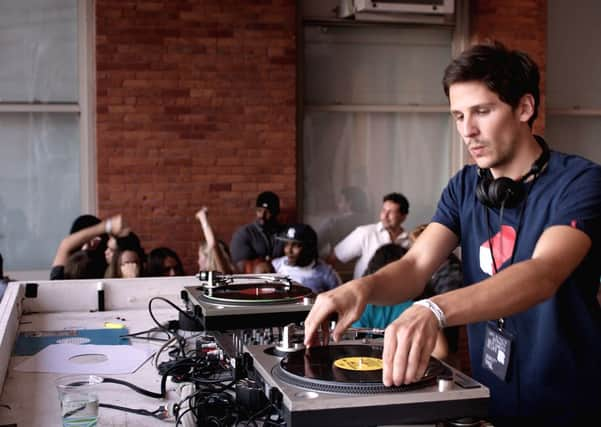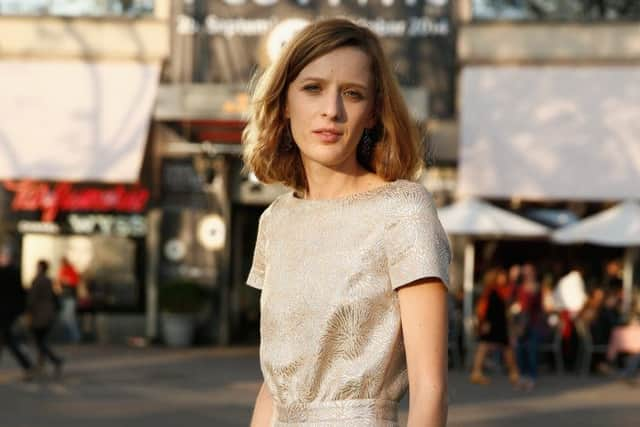Mia Hansen-Løve on her Daft Punk-inspired film Eden


Writing what you know can get you far, as Mia Hansen-Løve discovered when her second and third films – the intensely personal Father of My Children and the intensely autobiographical Goodbye First Love – announced her as a major new voice in French cinema when she was barely 30. But with her new film Eden charting the explosion of the French dance music scene that gave rise to Daft Punk, one could be forgiven for thinking it marks a change of approach for the now-34-year-old filmmaker. But, no, Hansen-Løve was there too, going out to Parisian clubs as a teen with her older brother Sven, a contemporary and friend of Daft Punk who spent 20 years or so living the vampiric lifestyle of a DJ without ever really making it big. “He kind of left me the keys to his own stories,” says Hansen-Løve, who co-wrote Eden with Sven. “He really trusted me and allowed me to tell the story from my own perspective.”
The resulting movie, which headlines Glasgow Film Festival’s Sound and Vision strand this weekend, is an epic generational coming-of-age tale that fictionalises her brother’s story via a young clubber called Paul (Félix de Givry) who devotes much of the 1990s and 2000s to pursuing a career as a DJ. Part cultural history, part heartfelt exploration of the way reality has a habit of bleeding into your dreams as adulthood beckons, Eden captures the hedonistic abandon and inevitable comedown of youth with expert precision.
Advertisement
Hide AdAlthough she admits that a lot of her brother’s memories of the time are a “bit foggy because of all the drugs he was taking,” she says Sven does remember very clearly the moment – recreated in the film – that Daft Punk first played what would become their breakthrough single, 1997’s game-changing Da Funk, at a fancy dress party in one of their parents’ homes. “They must have been about 20 and wanted to get the reaction of their friends – and my brother was there and remembers it exactly.”


Likewise, she remembers her own first exposure to Da Funk when Sven gave her a vinyl copy. “The fact that our memories are so precise about where we heard it proves that it already meant something. Of course now because Daft Punk are so famous you can say it’s easy to reconstruct the past, but from the start what was really striking was that there was a real feeling of excitement, a feeling that something important was happening.”
Adding to the film’s authenticity is the fact that Daft Punk feature throughout. Their willingness to let Hansen-Løve use their music for a low fee ultimately made the film possible and there’s a running gag in the film in which the duo – musicians Guy-Manuel de Homem-Christo and Thomas Bangalter – are repeatedly seen being denied entry to clubs playing their music or getting thrown out of the same clubs for not being cool enough.
“That actually came from a story they told us,” says Hansen-Løve. “It wasn’t in the script originally, but when we gave it to Thomas to read, he told us that just before the release of R.A.M. [their mega-selling 2013 album Random Access Memories] they were thrown out of this very fancy club designed by David Lynch called Silencio – the one you see them getting kicked out of in the film. He said there’s just something about them physically that doormen don’t like, and because they don’t want to say they’re Daft Punk every time, they have trouble getting in.”
Daft Punk’s extraordinary career trajectory also provided the film with unexpectedly timely reference points. Initially wanting to make two films – one charting the rise of the scene, the other charting the ultimate failure of her brother’s attempts to make it as a DJ — she struggled to raise the finance and had to condense it into a single movie that retained the same two-part rise/fall structure. The delays, however, meant that just as she was finishing the script, Daft Punk were getting ready to release Random Access Memories, which spawned the über-infectious global hit, Get Lucky.
“The timing was perfect,” she says: not only was she able to include the song in the film, but Daft Punk’s sudden ubiquity reinforced the cultural importance of the scene and made the contrast with the failures of her own protagonist, Paul, even more poignant. “If I had made a biopic of Daft Punk it would have been much easier to finance, but I thought it was much more interesting to make it from the point of view of someone who doesn’t succeed on that level.” She laughs. “How many Daft Punks and how many Pauls are there in life, you know?”
Advertisement
Hide AdThe irony, she says, is that interest in the film has sucked her brother Sven back into the scene. “We made it as a way for him to turn the page and move on” – the point at which the movie ends, she says, is really the point at which they started writing Eden – “but actually now with the film, everyone wants him to DJ again, so he’s having a complicated time of it. He’s still determined to move on with his life, but with all the festivals we’ve been going to for the release, the parties we’ve organised and the work we’ve done on the soundtrack, he can’t help but go back to the nightclub life. The music scene is very tempting.”
• Eden screens at Glasgow Film Festival today and tomorrow, glasgowfilm.org. It will be released in cinemas nationwide on 24 July.